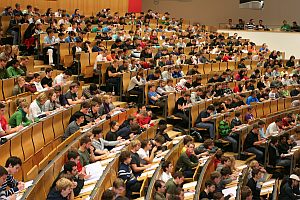Mechanical engineering, economy, or information science? University, university of applied sciences, or cooperative state university? Pupils interested in studies in Baden-Württemberg do not only have to decide in favor of a subject, but also of an adequate institution. On Wednesday, March 31, from 18.30 hrs, KIT, the University of Applied Sciences, and the Baden-Württemberg Cooperative State University will inform about the studies offered by them in the Tulla-Hörsaal (building 11.40) on KIT Campus South.
Many studies courses in particular in engineering or economic sciences are offered at various types of university. Which of them corresponds to the expectations, capabilities, and objectives of the pupils interested? Will the bachelor degree be followed by a master degree? What about the professional perspectives? These and other questions will be answered by representatives and students of the three universities at the information event.
Professor Jürgen Becker, Acting Division Director for Studies and Teaching at KIT, Professor Dieter Höpfel, Vice-Rector for Studies, Teaching, and International Matters of the University of Applied Sciences, and Professor Georg Richter, Vice-Rector of the Baden-Württemberg Cooperative State University in Karlsruhe will first present briefly their education institutions and the studies offered. Then, students of the three universities will report about their experience. During the final “expert talk”, the representatives of the universities will discuss further questions of the pupils.
The information event will be moderated by Oliver Broschart, advisor at the KIT Information and Consultancy Center (zib) that organizes this evening. Information material on the studies offered by the universities will be displayed at information booths in the entrance hall of the Tulla-Hörsaal. The event addresses pupils of the grades 11 to 13.
Detailed information: www.zib.kit.edu
In close partnership with society, KIT develops solutions for urgent challenges – from climate change, energy transition and sustainable use of natural resources to artificial intelligence, sovereignty and an aging population. As The University in the Helmholtz Association, KIT unites scientific excellence from insight to application-driven research under one roof – and is thus in a unique position to drive this transformation. As a University of Excellence, KIT offers its more than 10,000 employees and 22,800 students outstanding opportunities to shape a sustainable and resilient future. KIT – Science for Impact.

